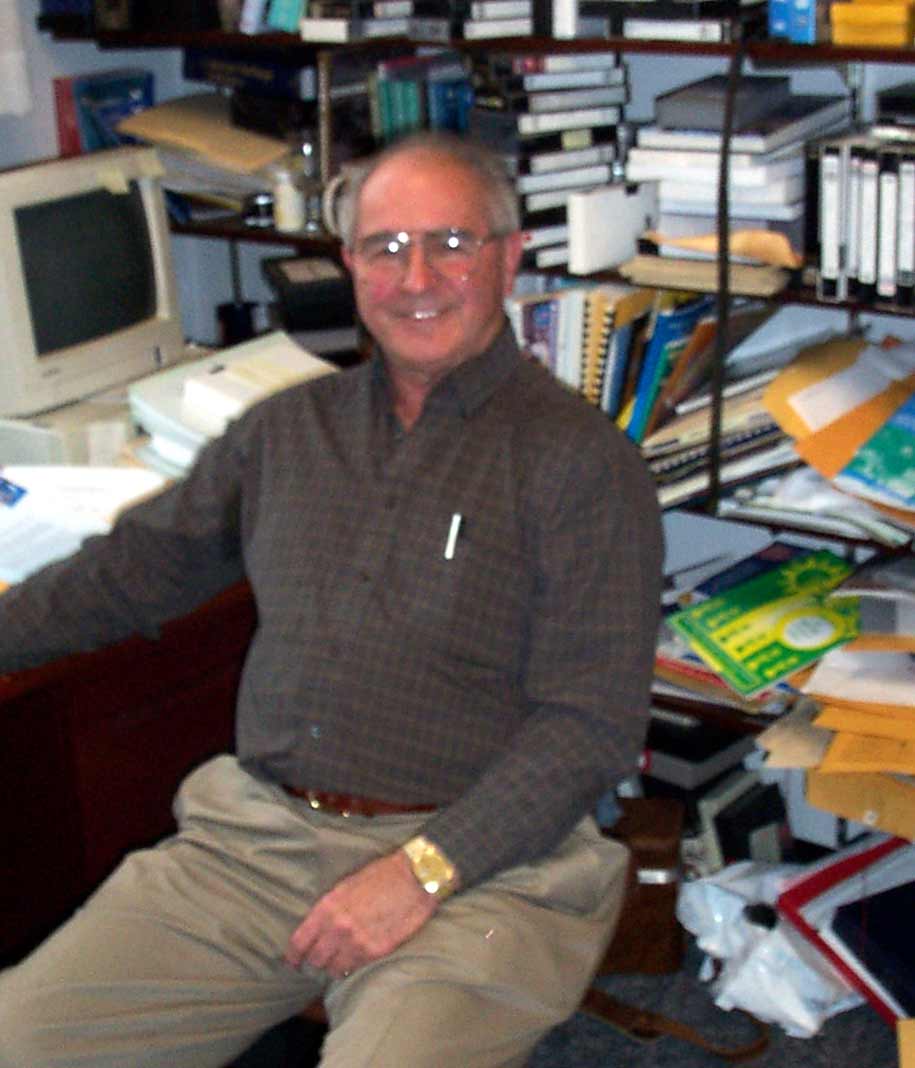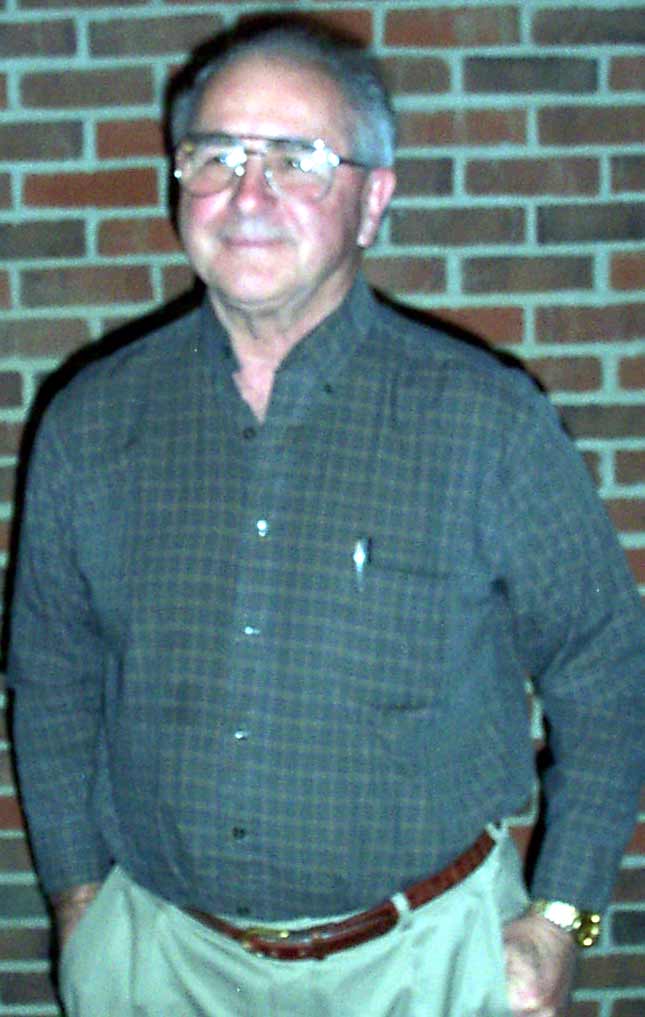Dr. Alan Stephenson
Teaching in the present, Archiving the past
Born December 12, 1930 in upstate New York, Alan Stephenson started out, as he says "dirt poor". It was the Depression and his father was only working about a day every three to four weeks. Alan not only has heard stories about this time of his life, but he actually has intense recollection of his early years - all the way back to age two.
He remembers the "Relief Act" of 1937, which was the first national welfare program. He remembers his mother showing him the check they received from this program.
He remembers the election of 1936 "As Maine goes, so goes Vermont". Al Landon took 2 states and no more that year.
He remembers the death of Pope Pious XII; he listed to the news stories about the abdication of King Edward on the radio and; he heard FDR's Pearl Harbor speech making December 7th "a day that will live on in infamy".
Alan grew up in the country. He remembers his mother ringing the bell calling him and his two brothers home for dinner.
Education was very important to his family. His mother had gone to school, which was not common practice at the time. His grandfather had raised three girls and sent each one to four years of college. Alan's mom earned a degree in Chemistry and became a teacher like another sister. The third became a nurse.
Alan was bused to High School. It was a unique experience for him, because he was the "kid from the country" not like the city kids who usually attended the school. Most of the "country kids" around him where not interested in school, but Alan was determined to break that mold and get an education just like the "city kids". He attended Saratoga High School where he graduated 8th in a class of 108. Alan ran track, joined the theater group and the Photography Club. He worked on the school newspaper and the yearbook, and by senior year he was accepted by the "city kids".
He went on to earn both a Bachelors Degree in History and a Masters Degree in Science at the University of Albany. While working on his masters he received a teaching fellowship in Biology, the origin of his teaching career. He considers himself lucky, since this was the first group of teaching fellows the school ever had.
The first few years Alan didn't do very well in school, in fact he almost failed. By his junior year the Korean War had started. He knew he would be drafted into the Army so he started the process early and on December 28, 1950 he joined the Air Force and went to Japan. He was stationed at a long-range radar outpost where he watched Russian MiGs. "I can tell you Japan is not all subtropical. Japan in the winter, especially where I was stationed got very, very cold."
Alan was on active duty for 43 months instead of the standard 48, because the war ended and RIF (reduction in forces) went into effect. September 4, 1954, Alan went home. Two weeks later he was back in college.
His education was far from over. He also earned a PhD in Communications from Ohio State University.

One day, Alan made plans with a girlfriend to go to the State Fair. While he was waiting for her he picked up a newspaper that had an article about the State College starting a television project. He wrote them a note telling of his experience in theater, photography and his electronics experience from the Air Force. He casually wrote, "Call if you need me".
When he came back from the State Fair a few days later he was called and offered the job of running the Campus Cable System. He later became an advisor for MPATI - the Midwest Program on Airborne Television Instruction - where he devised a series of programs for other teachers use.
While in a hotel room in Ann Arbor, where he was visiting the University of Michigan and setting up their program, he met a man who offered him a job in Boston Mass. Where he became the Director of School television for the entire state of Mass. He stayed there three years.
Alan is the first original employee of WVIZ, Channel 25. Although Betty Cope was there already as a consultant, Alan was the first employee. He also made the very first on-air announcement for that station. He stayed with WVIZ for 15 years. He was in charge of all school programs. At one point it was the leading station supplier of school programming in the entire country. Alan became assistant manager of the station. He passed up opportunities to go to other stations in other cities. "I liked Cleveland and WVIZ. There was no reason to leave".
After awhile he felt it was time to move on and he free-lanced for a while. He was executive vice president of a small cable company for about two and a half years and then decided to switch to teaching. He had always said he would teach college some day, and that day had come. He found they were looking for a teacher at what is now the University of Louisiana at Lafayette. He rented out his house in Cleveland and moved himself down to Louisiana. He came back to Cleveland at Christmas and talked to some people at John Carroll University where he heard there was a position open to upgrade the television department.
Oil prices were very low during this time, which meant the State of Louisiana was having financial difficulties. State run schools were scaling back 10% and Alan knew as a last hire he would be one of the first to be laid off. So he moved himself back to Cleveland in the fall of 1985 and went to work for JCU. He teaches a variety of communication courses including television production, film, photojournalism and broadcast management. He is now the Director of the Graduate Program in Communications Management.

He still has a great passion for history and although he teaches communications "I always say that every course I teach is a history course in one way or another".
He has an open-door policy with his students. He welcomes questions and comments and is always willing to help.
He credits his thirst for education to a number of things: the fact that he remembers so much of history and as such, was part of it; his mother's emphasis on education and; his Uncle Morgan. Morgan was actually his mother's uncle, Alan's great-uncle, and he thought of Alan as "a son". Morgan was a very successful man and helped Alan and his family financially, including the cost of Alan's education.
His Uncle Morgan also got him started in one of his great obsessions - document collecting. "It is fascinating to hold in your hand the same document that were held by people hundreds of years before. It is a visible, physical part of history."
He cherishes all of his documents, but has two that he holds dearer than most. The first is a pay slip to a man to make a "worm", which was a cannon cleaning device used in the American Revolutionary War. The man was Ephraim Beardsley, who, as it happens, is also a relative of Stephenson's.
The second is his paternal great grandfather's naturalization papers from when he came to this country from England. On his Mom's side, the Beardsleys, the family came to this country in 1635, a mere ten years after the pilgrims.
Among his other documents are an original wanted poster offering $500,000, a letter from a man in debtor's prison begging to be let out because he was too old to pay, and advertisement for the opening of the Erie Canal and the New York Herald's front-page headlines declaring the start of the Civil War.
It is his interest in history, his love of the world of television and his "collector-mentality" that brought him together with JCU graduate and original Channel 5 personality, Jim Breslin. Much of the news and archived material at Channel 5 was on 16mm film and was taking up a tremendous amount of room. The station was planning on discarding all of it. Breslin went to Fr. O'Malley, the president of John Carroll and asked if there was a way to store these records at the school. Fr. O'Malley and Dr. Stephenson got together and found an old vault they could safely be stored in. Alan started the process of cataloging. "There were 250,000 items in one place. This is much larger than your mind is telling you!" They now keep videotape there as well. It is not just coincidence that the building that houses the Communications Department that Dr. Stephenson heads is called "The O'Malley Center" after Fr. O'Malley.
He traveled extensively with WVIZ. He's been to Africa 3-4 times and went behind the Iron Curtain for a story on the Holocaust. He saw Egypt in 1971 "through a view finder" so he went back about ten years ago. He's co-authored a book on Broadcast performance, and had his photographs shown (and sold) at the Boston Mills Art Show. And when he's not teaching, collecting, archiving, photographing or helping his students you may find him at the JCU football games working on the "Chain Gang" with the sideline crew.
Dr. Stephenson has no plans of quitting any of these things he loves - rather there is a good chance he will add to his agenda before he deletes anything. "I plan to keep teaching and working with the kids. When I stop doing 110% - kick me out. Until then, I'm not going anywhere."
It is a good thing for his students as well as all of us with an interest in our history that Dr. Stephenson has no plans to retire. Too much will be lost if he is not here to remind us of our past and help us communicate it's message for our future.
Profiled by Debbie Hanson
Top of Page
Back to Profiles of Cleveland Seniors
|